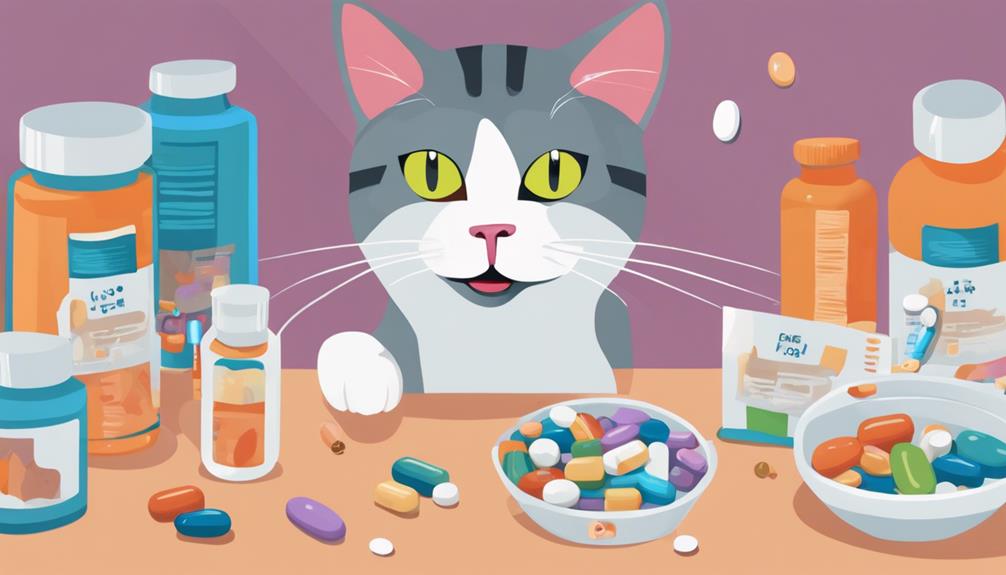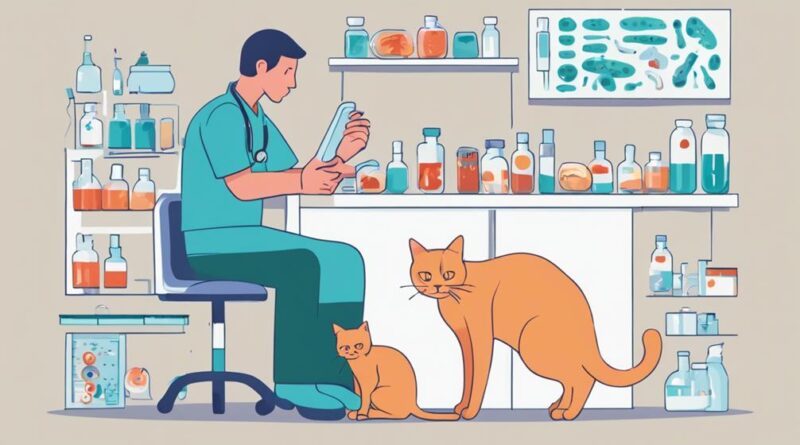How to Choose Gastrointestinal Medication for Your Cat
When it comes to choosing the right gastrointestinal medication for your feline companion, remember the old saying, 'An ounce of prevention is worth a pound of cure.'
Understanding your cat's specific needs and the available treatment options can be pivotal in ensuring their health and well-being.
Whether your cat is experiencing occasional tummy troubles or chronic digestive issues, making informed decisions about their medication is crucial.
Let's explore the factors that can help you navigate this important aspect of your cat's care.
Common Gastrointestinal Issues in Cats
If your cat is experiencing frequent vomiting or diarrhea, it may be indicative of common gastrointestinal issues. Dietary management plays a crucial role in addressing these issues in cats. Ensuring your cat is on a balanced and easily digestible diet can help alleviate gastrointestinal disturbances. Opting for high-quality cat food that's gentle on the stomach and free from potential allergens can make a significant difference in your cat's digestive health.
In addition to dietary management, probiotic supplements can be beneficial for cats with gastrointestinal issues. Probiotics are live microorganisms that promote a healthy balance of gut bacteria. They can aid in digestion, reduce inflammation in the digestive tract, and strengthen the immune system. When selecting probiotic supplements for your cat, opt for ones specifically formulated for felines to ensure they're safe and effective.
Introducing probiotic-rich foods like yogurt or specially formulated probiotic treats can also be a good way to incorporate these beneficial bacteria into your cat's diet. However, always consult with your veterinarian before starting your cat on any new supplements or making significant changes to their diet. By combining proper dietary management with probiotic supplements, you can help support your cat's gastrointestinal health and improve their overall well-being.
Symptoms to Watch for
Keep an eye out for signs like persistent vomiting or diarrhea in your cat, as they could indicate underlying gastrointestinal problems. If you notice your feline friend experiencing frequent vomiting or diarrhea, it's essential to monitor them closely. Other symptoms to watch for include sudden dietary changes, as cats can be quite sensitive to alterations in their food. Weight loss is another crucial indicator of gastrointestinal issues in cats. If your cat is losing weight without any apparent reason, it could be a sign of an underlying problem that needs attention.
Vomiting and diarrhea are common symptoms that can point towards various gastrointestinal issues. While occasional vomiting may not be alarming, persistent or severe vomiting shouldn't be ignored. Diarrhea, especially when accompanied by blood or mucus, can also indicate a more serious problem. Keep an eye on the frequency and consistency of these symptoms to provide your veterinarian with important information for diagnosis.
It's important to note that these symptoms can be indicative of a range of gastrointestinal disorders, from dietary intolerances to infections or more severe conditions. Therefore, if you observe any of these signs in your cat, it's crucial to seek veterinary advice promptly. Your veterinarian can conduct a thorough examination to determine the underlying cause of these symptoms and recommend an appropriate treatment plan to help your cat feel better.
Consulting Your Veterinarian
When your cat exhibits concerning gastrointestinal symptoms, seeking guidance from your veterinarian is crucial for proper diagnosis and treatment. Your veterinarian will provide personalized recommendations based on your cat's specific needs. Here are some key points to keep in mind when consulting your veterinarian:
- Dietary changes: Your vet may suggest switching to a specialized diet to address your cat's gastrointestinal issues. Monitoring your cat's food intake and any resulting changes in symptoms is essential to evaluate the effectiveness of the new diet.
- Lifestyle adjustments: Your veterinarian may recommend lifestyle changes to improve your cat's gastrointestinal health. This could include reducing stressors in your cat's environment or increasing exercise to promote digestion.
- Supplements: In some cases, your vet may recommend supplements to support your cat's gastrointestinal system. These supplements can help improve digestion and overall gut health.
Types of Gastrointestinal Medications
Explore various types of gastrointestinal medications that can help alleviate your cat's digestive issues. When it comes to medication options for your cat's gastrointestinal problems, there are several types that your veterinarian may consider.
Probiotics are a common choice and can help restore the balance of good bacteria in your cat's gut, aiding in digestion.
Antibiotics may be prescribed to combat bacterial infections causing gastrointestinal distress, but they should only be used under veterinary guidance to prevent antibiotic resistance.
Antiemetics are medications that can help control vomiting and nausea, providing relief to your cat.
Dietary supplements such as digestive enzymes or fiber can also be beneficial in supporting your cat's digestive system.
The treatment effectiveness of these medications can vary depending on the underlying cause of your cat's gastrointestinal issues. Probiotics can be effective in maintaining a healthy gut flora balance, especially after antibiotic treatment. Antibiotics are highly effective in treating bacterial infections but should be used judiciously to prevent resistance. Antiemetics can provide quick relief from vomiting and nausea, improving your cat's comfort. Dietary supplements can support digestion, especially in cats with dietary sensitivities or deficiencies. Discuss with your veterinarian the most suitable medication options for your cat's specific condition to ensure the best treatment effectiveness.
Over-the-Counter Options
To address your cat's gastrointestinal issues effectively, consider looking into over-the-counter options that can provide relief. When it comes to your feline friend's tummy troubles, natural remedies and dietary changes can often make a significant difference.
Here are some options to consider:
- Probiotics: These supplements can help restore the balance of good bacteria in your cat's gut, promoting healthy digestion.
- Digestive Enzymes: Adding digestive enzymes to your cat's diet can aid in the breakdown of food, especially for cats with sensitive stomachs.
- Pumpkin: A natural source of fiber, pumpkin can help regulate your cat's bowel movements and ease constipation or diarrhea.
- Grain-Free Food: Switching to a grain-free diet can sometimes alleviate gastrointestinal issues, as some cats may have sensitivities to grains.
Prescription Medication Considerations
Consider consulting with your veterinarian to determine the most suitable prescription medication for addressing your cat's gastrointestinal issues. When it comes to prescription medication for your cat, it's crucial to follow dosing guidelines provided by your veterinarian strictly. Giving the right amount at the right time is essential for the medication to be effective without causing harm. Be sure to understand the potential side effects of the medication prescribed. While side effects can occur with any medication, being aware of them can help you monitor your cat's response and seek help if needed.
Additionally, be mindful of potential drug interactions if your cat is on other medications. Certain drugs can interact negatively with each other, impacting their effectiveness or causing harmful side effects. Inform your veterinarian about any other medications or supplements your cat is taking to avoid complications. If your cat requires long-term medication, discuss this with your veterinarian. Some gastrointestinal medications are safe for extended use, but others may have risks associated with prolonged use that need to be managed.
Administering Medication to Your Cat

When giving medication to your cat, ensure you administer it precisely as directed by your veterinarian to ensure effectiveness and safety. Here are some essential tips to help you properly administer medication to your feline friend:
- Proper Dosage: Always measure the medication accurately using a syringe or dropper as per the prescribed dosage. Avoid estimating or skipping doses to prevent under or overdosing.
- Timing of Administration: Administer the medication at the same time each day to maintain a consistent level in your cat's system. This will help optimize the drug's effectiveness.
- Stay Calm and Patient: Cats can be sensitive to changes in their routine, so approach medication time calmly and patiently. If your cat becomes stressed, take a break and try again later.
- Follow-Up Care: Monitor your cat for any side effects or changes in behavior after giving the medication. Contact your veterinarian immediately if you notice anything concerning.
Monitoring Your Cat's Progress
Once your cat has started the prescribed medication, regularly observing and tracking their response is crucial to ensure the treatment's effectiveness and address any potential concerns. Monitoring your cat's progress involves paying close attention to how they're responding to the medication. Keep track of any changes in their behavior, appetite, litter box habits, and overall well-being. By tracking improvements or setbacks, you can provide valuable information to your veterinarian to make informed decisions about your cat's treatment plan.
In addition to observing your cat's response, it may be necessary to adjust the dosage of the gastrointestinal medication. If you notice that your cat isn't showing signs of improvement or if their symptoms worsen, consult your veterinarian before making any changes to the dosage. Your vet may recommend increasing or decreasing the medication based on your cat's specific needs. It's important to follow your vet's instructions closely and not alter the dosage without their guidance.
Frequently Asked Questions
Can I Give My Cat Human Gastrointestinal Medication if They Are Experiencing Stomach Issues?
If your cat is having stomach issues, avoid giving them human gastrointestinal medication. Stick to cat-specific medication or consider natural alternatives.
Dosage differences between human and veterinary medications can be significant and may harm your pet. It's best to consult a veterinarian for proper guidance on choosing the right medication for your cat's gastrointestinal problems.
Are There Any Natural Remedies or Supplements That Can Help With My Cat's Gastrointestinal Issues?
When your cat has gastrointestinal issues, consider herbal remedies and probiotic supplements to support their digestion. Dietary adjustments and holistic approaches can also help alleviate stomach problems.
Look for natural solutions that can soothe your cat's tummy troubles and promote gut health. Always consult with your vet before starting any new supplements or making significant changes to your cat's diet.
Prioritize your cat's well-being by exploring gentle, natural options for their gastrointestinal health.
How Long Should I Wait to See Improvement in My Cat's Symptoms After Starting Them on Gastrointestinal Medication?
After starting your cat on gastrointestinal medication, you should monitor progress closely. Improvement timelines vary, but typically you may see positive changes within a few days to a couple of weeks. If there's no improvement, consult your vet for advice on adjusting the dosage or follow-up care.
Regular communication with your vet is key to ensuring your cat's health and well-being.
Can Certain Foods or Treats Worsen My Cat's Gastrointestinal Issues, Even When They Are on Medication?
Certain foods or treats can indeed worsen your cat's gastrointestinal issues, even with medication. It's crucial to be mindful of dietary restrictions and opt for treat options that are gentle on their stomach.
Allergies and sensitivities can also play a role, so pay attention to how your cat reacts to different foods. Consult your veterinarian for guidance on what foods to avoid and which treats are safe for your cat's sensitive stomach.
Are There Any Potential Long-Term Side Effects of Using Gastrointestinal Medication for My Cat?
Using gastrointestinal medication for your cat can pose potential risks. Some medications may have long-term side effects, such as changes in kidney or liver function. To prevent these issues, it's crucial to follow your vet's instructions carefully.
Managing expectations is key – understand that some side effects may occur. Monitoring your cat's progress closely and informing your vet of any concerning changes can help in addressing any issues promptly.
Conclusion
Now that you know the common gastrointestinal issues in cats, the symptoms to watch for, and the types of medications available, you can make an informed decision on how to best treat your furry friend.
Remember to consult your veterinarian for guidance, consider over-the-counter and prescription options, and always monitor your cat's progress closely.
With the right medication and care, your cat can soon be back to feeling their best.
